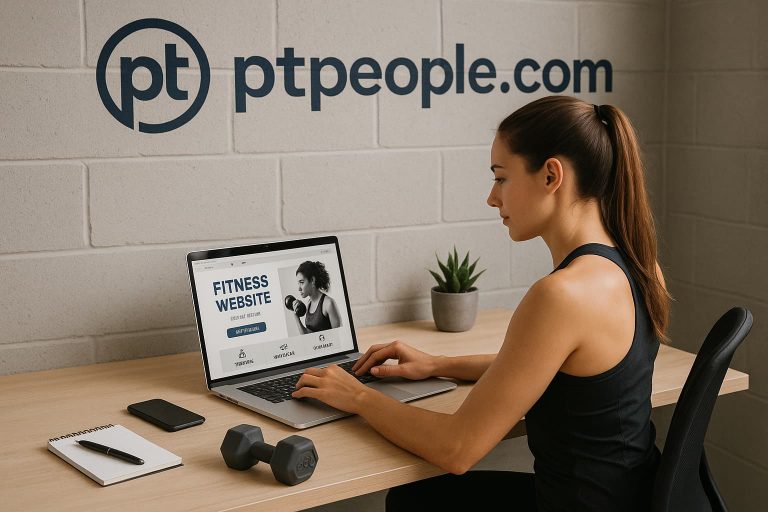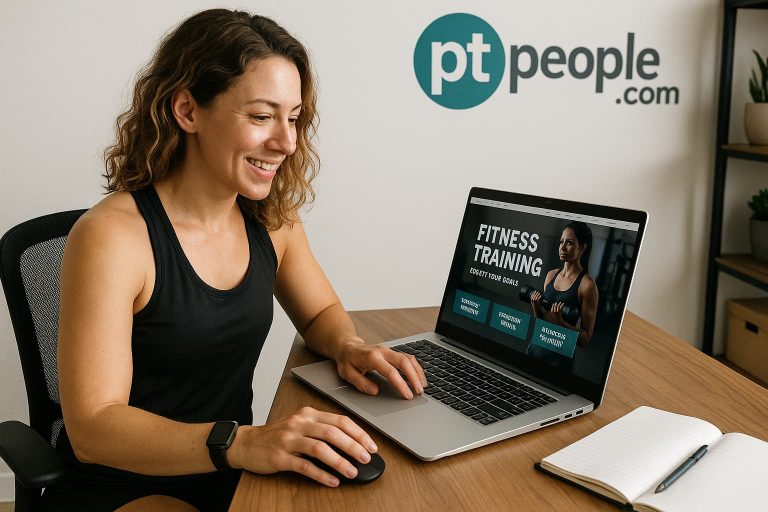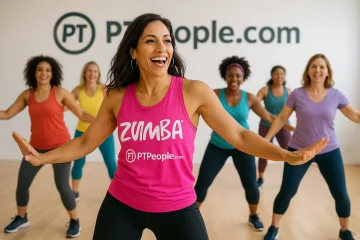About us: Connecting personal trainers with individuals seeking expert fitness guidance. Find your ideal trainer today!


Digital Marketing
for Personal Trainer
Websites
Enter Location......
No options
{{ option.count }}
Websites for Personal Trainers: How to Build a Million‑Dollar Fitness Business
In today’s fiercely competitive fitness industry, how to market yourself as a personal trainer is no longer optional — it’s essential. Whether you’re a freelance PT, gym-based coach, or an online fitness influencer, mastering digital marketing for personal trainers can be the difference between struggling and building a six- or seven-figure business.
This detailed guide reveals proven marketing strategies for personal trainers, combining social media marketing for personal trainers, local SEO for personal trainers, and targeted advertising tactics tailored to fitness professionals. Along the way, I’ll share insights from my own journey as a UK Level 3 certified trainer and founder of ptpeople.com, a global platform built to help trainers market themselves and acquire more clients.

Why Marketing is Crucial for Personal Trainers
Personal training is both a craft and a business. Without effective marketing, even the most skilled trainers struggle to attract clients consistently. To grow, you need to understand how to get personal training clients fast through strategic digital techniques.
Marketing goes beyond social media posts and flyers—it’s about building trust, defining your niche, and positioning yourself as the expert. With the rise of virtual coaching, the fitness marketplace has expanded, but so has competition. If you’re asking what is the best way to market a personal training business, the answer lies in combining local SEO, social media, paid advertising, and email marketing into a cohesive strategy.

Build a Powerful Personal Trainer Online Brand
Your brand is the promise behind your services. It reflects your personality, values, and what makes you unique.
Start by selecting a specific niche, whether it’s weight loss, strength training, postnatal fitness, or functional fitness for older adults. From there, create a website optimized with fitness trainer website design tips—mobile-friendly, fast-loading, and with clear services and client testimonials.
For step-by-step guidance, check ptpeople.com/build-a-personal-trainer-website-fast/. Use Instagram and TikTok to share insights using Instagram strategy for personal trainers, client transformations, and workout demos.

Master Local SEO Strategies for Fitness Trainers & Gyms
Even as a virtual coach, local clients often provide the foundation of your income. To target them, optimize your Google Business Profile and website for terms like “personal trainer in London” or “fitness coach near me.” This is classic local SEO for personal trainers.
To improve your presence online, consider the listing packages via ptpeople.com/personal-trainer-advertising-packages/. Ensure your website has location-based pages and uses schema markup to help search engines understand your services and geographic reach.

Harness Social Media Marketing as a Fitness Coach
Social platforms are powerful engagement tools when used intentionally. Instagram works especially well when leveraged with fitness trainer marketing ideas like Reels, before-and-after stories, and educational carousels.
Consistency is key—schedule 3–5 posts weekly and use tools like Later or Buffer to stay organized. Engage authentically by replying to comments and hosting Q&As, and grab inspiration from the blog at ptpeople.com/blog/ for ideas tailored to fitness professionals.
Personal Trainer Targeted Paid Advertising
Paid ads can quickly generate high-quality inquiries. Use Facebook and Instagram ads targeting local areas—such as Manchester, Tokyo, or Dubai—and specific demographics. Craft ads around clear offers like a free consultation or a trial.
Send traffic to landing pages optimized via ptpeople.com/build-a-personal-trainer-website-fast/. Track performance metrics like cost-per-acquisition, tweak your targeting, and test new creatives based on what resonates.
Leverage Email Marketing for Freelance Health & Wellness Trainers
Email remains one of the most ROI‑driven channels in the marketing mix. Start by offering a lead magnet—such as a workout plan or nutrition guide—in exchange for emails. Then, nurture contacts with automated email sequences designed to educate, inspire, and convert into paying clients.
Regular newsletters featuring tips, client triumphs, and exclusive deals keep you front of mind. You can find email marketing for fitness coaches prompts and strategies in ptpeople.com/how-to-advertise-your-personal-training-services-13-proven-hacks/.
PT Website SEO & Content for Client Attraction
SEO brings in clients consistently—without ads. By ranking for local SEO for personal trainers and long-tail phrases like “best personal trainer for weight loss in London,” you become visible to those actively searching.
One strategic move is publishing blog content that answers client questions: e.g., “how to find the best personal trainer anywhere in the world” and “personal trainer cost in Abu Dhabi.” For inspiration, check ptpeople.com/how-to-find-the-best-personal-trainer-anywhere-in-the-world/ and ptpeople.com/personal-trainer-cost-in-abu-dhabi/.
Track performance via Google Analytics and Search Console, and update your content based on trending topics and search queries.
Publish Educational Fitness Content
Clients love trainers who educate. Create blog posts answering “how often should I see a personal trainer?” or “best nutrition tips for fat loss.” Complement with social video tutorials and client testimonials to build authority. These efforts feed both SEO and trust.
Avoid Common Fitness Web Design Mistakes
Many trainers fall flat by skipping consistent content, ignoring SEO, or forgetting to follow up leads. Address these mistakes early. Build systematic funnels and consistent outreach efforts. Read the guide at ptpeople.com/how-to-advertise-your-personal-training-services-13-proven-hacks/ to tighten your approach.
Fitness Website Template System for Growth
A reliable funnel includes awareness (social, ads), lead capture (landing page + lead magnet), nurturing (email campaigns), and conversion (consultation booking). Use a CRM to track leads and optimize your touchpoints with insights.
Track Your Fitness Marketing
Marketing success depends on tracking performance. Use Google Analytics for website data, Facebook Ads Manager for campaign ROI, and email metrics for open/click rates. Analyze and refine monthly to ensure your strategies remain effective.
Focus on Local Fat Loss Clients
If you’re serious about growth, think globally. Optimize your strategy to attract clients in:
London, Birmingham, Manchester, Edinburgh (all UK locations)
New York, Los Angeles, and every major USA state
Tokyo, Seoul, Singapore
Paris, Berlin, Madrid
Sao Paulo
Sydney
Doha, Dubai
Toronto
Customizing your SEO content, social ads, and email messaging to each region enhances results and widens reach.
Frequently Asked Questions for Personal Trainers
Use a strong personal trainer website, fitness-specific SEO, and social proof. Tools like ptpeople.com help with digital marketing and lead generation.
Focus on local SEO keywords like “personal trainer near me”, Google Maps listing, and hyperlocal content about your city or area.
Yes. A fitness website builds trust, boosts search visibility, and converts visitors into clients. Check our guide to build a personal trainer website fast.
Post at least 3–5 times weekly using fitness hashtags like #fitcoach, #ptlife, and your city tags. See our top Instagram hashtags for personal trainers.
Instagram and Facebook are top choices. TikTok is growing fast for trainers targeting Gen Z. For more, visit Instagram for personal trainers.
Use a landing page with client results, an SEO blog, and Facebook Ads for personal trainers. Also list yourself on ptpeople.com.
Crucial. Search traffic brings long-term leads. Start with our guide on advertising your personal training services.
Use Google My Business, publish fitness tips on social, ask for referrals, and partner with gyms. Local press also works well.
Define your niche, use professional images, and stay consistent across all channels. Showcase reviews and transformations.
Yes, especially when starting out. Facebook, Google, and Instagram ads work well when targeted properly. Split test your copy and CTAs.
Yes. Optimising your website with terms like “personal trainer in London” increases traffic and conversions in your city.
Absolutely. Email helps build long-term client trust, promote offers, and follow up with leads. Use tools like Mailchimp or ConvertKit.
Use your story, client success results, niche expertise, and content marketing to show you’re not just another coach.
Publish blog posts like what personal trainers do and include long-tail keywords in meta titles and alt text.
Client testimonials, transformations, how-to exercise videos, and nutrition tips work best. Focus on value, not just selling.
Our Locations
North America Personal Trainers
Europe Personal Trainers
Asia Personal Trainers
Singapore
Hong Kong
Qatar
Africa Personal Trainers
Oceania Personal Trainers
South America Personal Trainers
Blog Search

Top 8 Best Personal Trainers in Dubai

Dubai is home to hundreds of personal trainers—253 verified professionals as of July 2025. Whether you’re aiming for fat loss, muscle gain, injury recovery or athletic performance, these elite trainers combine certifications, science-based programming, and individual support to transform your fitness journey. Chester Tan – Personal Trainer in Dubai Chester Tan designs customized strength, mobility, […]

Women’s Personal Training Is Thriving: Here’s Why (And How to Join the Movement)

Across Los Angeles, Dubai, London, and beyond — women’s personal training is booming in 2025. Whether it’s due to increasing awareness of hormonal health, the surge in postnatal fitness coaching, Yoga, Zumba or the rise of safe women-only gym spaces, female clients are seeking trusted, qualified personal trainers more than ever. That’s where PTpeople.com steps […]

Why Yoga Instructors Join PTpeople.com in London, Dubai, New York & Beyond

The global demand for yoga continues to grow, from London to Los Angeles, from Dubai to Singapore. Whether you’re a freelance yoga teacher, studio owner, or mobile instructor, the key to success lies in being visible online and connecting with the right audience. That’s where PTpeople.com comes in — a powerful platform helping yoga professionals […]

Do Zumba Classes Help Fat Loss | Can Zumba help you lose weight?

Zumba isn’t just a dance class — it’s a global movement that fuses cardio, culture, and community into one of the most addictive and effective ways to get fit. Whether you’re in Dubai, London, Toronto, or anywhere in between, joining a Zumba class near you could be the game-changer in your fitness journey. In this […]
Blog Categories
Personal Training Tips |
Fitness for Beginners |
Health & Wellness |
Home Fitness |
Body Building & Competition |
Weight Loss |
Personal Training |
Fitness Coaching Advice |
Marketing for Personal Trainers |
Social Media Marketing for Fitness Professionals |
Career & Jobs |
Website Design for Personal Trainers |
Personal Trainer Location |
Gym Life |
Personal Trainer Cost |
Gym Trainers |
Body Toning |
Bootcamp Classes |
Boxing Lessons |
Corporate Fitness |
Crossfit |
Dance Classes |
Endurance Training |
Flexibility Training |
Football Training |
Functional and Core Training |
General Fitness |
Group Training Classes |
Gymnastics |
Jiu Jitsu |
Karate |
Kickboxing |
Kids Fitness |
Martial Arts |
MMA Classes |
Online Personal Training |
Personal Training Business |
Physiotherapy |
Pilates Sessions |
Pre & Post Natal Training |
Rehabilitation & Injury Recovery |
Senior Fitness |
Special Needs Fitness |
Sports Training |
Strength & Muscle Gain |
Swimming Classes |
Tennis Classes |
Training with a Partner |
TRX Training |
Weight Loss & Nutritional Advice |
What is a Personal Trainer |
Women’s Fitness |
Yoga Instructors |
Zumba Classes
Become a PT People Listed Trainer
Trainers & Gyms: Increase your online visibility game and attract new clients globally. Click below to get started
